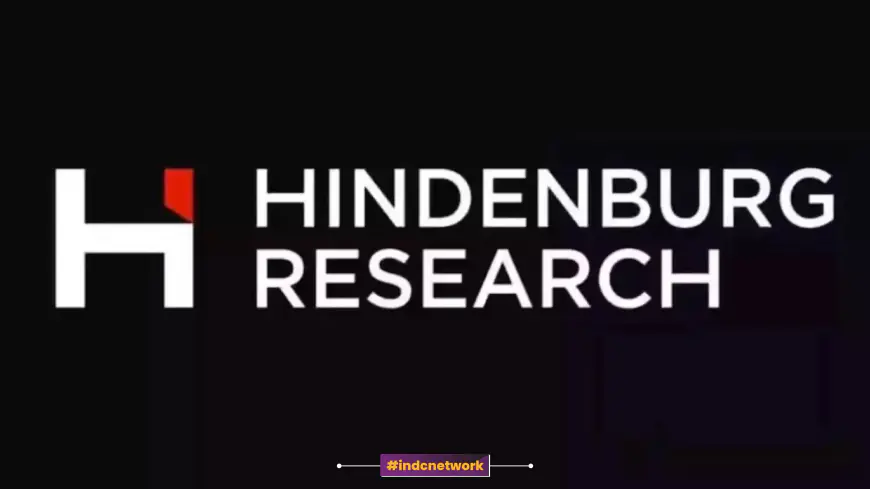Hindenburg Research: Unveiling the Controversial World of Corporate Short-Selling
Hindenburg ResearchHindenburg Research, founded by Nathan Anderson, is a U.S.-based financial research firm known for its controversial short-selling practices. The firm specializes in uncovering financial fraud, corporate governance lapses, and legal irregularities within companies. Despite facing criticism and legal challenges, Hindenburg has made a significant impact on financial markets, exposing companies like Nikola Corporation, Clover Health, and Adani Group. This article delves into the firm’s methodology, ethical concerns, and the high-profile cases that have defined its reputation.

INDC Network : Business : Hindenburg Research: Unveiling the Secrets Behind a Controversial Financial Research Firm :-
Introduction : Hindenburg Research is a U.S.-based financial research firm primarily known for its short-selling activities. Named after the infamous Hindenburg disaster of 1937, the firm embodies the metaphor that something grand and flashy can often conceal significant flaws, ultimately leading to its downfall. Hindenburg Research focuses on uncovering potential fraud, manipulation, and governance irregularities within companies, shining a light on the dark corners of the financial world.
Foundation of Hindenburg Research : Hindenburg Research was founded by Nathan Anderson, a man with a background in data analytics and information technology. Anderson's career began on Wall Street, where he gained invaluable experience and insights into financial markets. Leveraging this knowledge, he established Hindenburg Research with a mission to expose financial misconduct and protect investors from potentially disastrous outcomes.
Scope of Work : The primary focus of Hindenburg Research is on deep analysis of companies' financial statements, corporate governance practices, and other relevant aspects. The firm gathers both publicly available information and insider tips, utilizing these resources to produce comprehensive reports. Their investigations are centered around key areas, including financial fraud, corporate governance weaknesses, and legal irregularities.
Analyzing Financial Statements :Hindenburg Research delves into the balance sheets, income statements, and other financial documents of companies to identify any discrepancies or irregularities. By scrutinizing these documents, the firm aims to uncover instances of financial manipulation, such as inflated earnings, profits, or assets.
Corporate Governance Evaluation : The firm also evaluates the management and board of directors of a company, focusing on transparency, conflicts of interest, and overall governance practices. Companies with weak governance structures are often flagged for further investigation.
Regulatory Filings and Legal Issues : Hindenburg Research examines regulatory filings to detect any potential irregularities or violations. If a company has failed to disclose critical information to investors, the firm works to bring these omissions to light. This aspect of their work often leads to significant legal scrutiny for the companies in question.
Short Selling and Controversy
Hindenburg Research's business model is closely tied to short selling, a financial strategy where investors borrow and sell stocks in the hope of buying them back later at a lower price. The firm takes short positions based on their research and reports, profiting if the stock price drops following the release of their findings.
The release of Hindenburg's reports often triggers a sharp decline in the stock prices of the companies involved, leading to substantial financial losses for investors. As a result, the firm has faced criticism and accusations of intentionally publishing negative reports to drive stock prices down for profit. However, Hindenburg Research maintains that their primary objective is to expose corporate malfeasance and protect investors, not merely to make money.
Key Case Studies
Hindenburg Research has published reports on several high-profile companies, with some of these cases having a significant impact on the financial markets. Below are a few notable examples:
-
Nikola Corporation (2020): Hindenburg's report on Nikola, an electric truck manufacturer, alleged that the company had misled investors by exaggerating the capabilities of its products. The report accused Nikola of engaging in fraudulent practices to boost its stock price. Following the release of this report, Nikola's stock plummeted, and the company faced serious regulatory scrutiny.
-
Clover Health (2021): In 2021, Hindenburg Research targeted Clover Health, a healthcare insurance company, accusing it of concealing vital information from investors. The report claimed that Clover had failed to disclose significant regulatory issues and misled investors about the company's prospects. The aftermath saw Clover's stock price drop, and the company came under investigation by regulatory authorities.
-
Adani Group (2023): One of Hindenburg's most explosive reports came in 2023 when the firm accused India's Adani Group of fraud, governance lapses, and other irregularities. The report led to a massive sell-off in Adani Group's shares, making international headlines and raising concerns about the group's business practices.
Impact and Criticism
Hindenburg Research's work has a profound impact on financial markets. Their reports can lead to dramatic declines in the stock prices of targeted companies, resulting in significant financial losses for investors. While the firm argues that their research serves to protect investors by exposing risks, their methods and motives have been the subject of intense scrutiny.
Critics often label Hindenburg Research as "short-selling pirates," accusing them of magnifying minor issues and creating panic in the markets. Additionally, the firm is often criticized for allegedly targeting companies with the sole purpose of driving down stock prices to profit from their short positions.
Ethical Concerns and Regulatory Challenges
The nature of Hindenburg Research's work raises ethical questions about the balance between exposing corporate wrongdoing and profiting from it. While short-selling is a legal and sometimes necessary market mechanism, the dual role of researcher and investor can create conflicts of interest. This has led to calls for more stringent regulations governing the activities of short-selling research firms.
In response to these concerns, Hindenburg Research has repeatedly emphasized its commitment to ethical practices, transparency, and accuracy in its reports. The firm argues that by holding companies accountable, they are fulfilling a crucial role in maintaining the integrity of financial markets.
Hindenburg Research's Methodology
Hindenburg's research process is thorough and methodical. The firm relies on a combination of public data analysis, whistleblower accounts, and field investigations. This multifaceted approach allows them to build a comprehensive picture of the companies they investigate.
-
Data Analysis: Hindenburg's team meticulously analyzes financial statements, regulatory filings, and other public documents. They look for inconsistencies, red flags, and patterns that might indicate financial manipulation or governance failures.
-
Insider Information: The firm often receives tips from insiders or whistleblowers who provide confidential information about corporate misconduct. This insider data can be crucial in corroborating the findings from public records.
-
On-the-Ground Investigations: In some cases, Hindenburg conducts field investigations to gather evidence. For example, they might visit a company's facilities or interview employees and industry experts to verify claims made by the company.
Challenges and Legal Battles
Given the controversial nature of their work, Hindenburg Research frequently faces legal challenges from the companies they investigate. These companies often accuse Hindenburg of defamation, market manipulation, and other legal violations. However, the firm has been successful in defending its reports in court, arguing that their findings are based on thorough research and are protected under free speech laws.
The legal battles and public backlash have not deterred Hindenburg. Instead, they have reinforced the firm's reputation as a fearless watchdog willing to take on powerful corporations. This combative stance has made Hindenburg both respected and reviled in equal measure.
Conclusion : Hindenburg Research stands as a significant player in the world of financial research, with a mission to uncover corporate fraud and protect investors. Despite the controversies and criticisms surrounding its methods, the firm has made a lasting impact on the financial markets. Their reports have not only led to significant market movements but have also sparked broader discussions about corporate governance, transparency, and the role of short-sellers in the market.
The future of Hindenburg Research will likely continue to be marked by high-stakes investigations, legal battles, and debates about the ethical implications of their work. As long as there are companies willing to bend or break the rules, firms like Hindenburg will have a role to play in keeping them in check. The challenge for Hindenburg, and for the market as a whole, will be finding the right balance between holding corporations accountable and ensuring that the pursuit of profit does not overshadow the pursuit of truth.
What's Your Reaction?













































































































































































